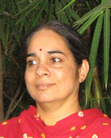Narada
Narada - for those who aren't familiar with the name (read non-Indian) - was a rishi well known both for his intelligence and his predilection for making mischief. Ever since I was so high, I have heard trouble-makers called Narada, and it wasn't meant as a compliment.
Today, as I read the Uttara Kanda, the final book of the Ramayana, I suddenly realise that Narada is a thoroughly modern figure. Or postmodern. Or post truth. Or something. (Ok, I have no idea of the strict definition of these terms, but you get the general idea.) That is to say, he is not like the other characters in the epic - earnest, humourless, intent on their chosen path, good or bad. His view of the world is complex, philosophical and irreverent. He is an observer and commentator, not a participant, although he also sets events in motion. And despite his mischief making, he is capable of compassion, as his droll description of the human condition demonstrates. Like the intricate narrative structure set up in the Bala Kanda, this canto shows Valmiki at his most complex best - or else it proves that the first and last books were later additions to the epic, as some scholars hold: take your pick.
I almost fell off my chair laughing at the chapter below. Having picked myself up, I have to share the wonderful read. Please tell me you find it funny too!
The excerpt below is adapted from Canto XX, Uttara Kanda, Srimad Valmiki Ramayana, Gita Press, 4th edition.
Today, as I read the Uttara Kanda, the final book of the Ramayana, I suddenly realise that Narada is a thoroughly modern figure. Or postmodern. Or post truth. Or something. (Ok, I have no idea of the strict definition of these terms, but you get the general idea.) That is to say, he is not like the other characters in the epic - earnest, humourless, intent on their chosen path, good or bad. His view of the world is complex, philosophical and irreverent. He is an observer and commentator, not a participant, although he also sets events in motion. And despite his mischief making, he is capable of compassion, as his droll description of the human condition demonstrates. Like the intricate narrative structure set up in the Bala Kanda, this canto shows Valmiki at his most complex best - or else it proves that the first and last books were later additions to the epic, as some scholars hold: take your pick.
I almost fell off my chair laughing at the chapter below. Having picked myself up, I have to share the wonderful read. Please tell me you find it funny too!
The excerpt below is adapted from Canto XX, Uttara Kanda, Srimad Valmiki Ramayana, Gita Press, 4th edition.
While riding in the Pushpaka and terrorising the mortals on earth, Ravana met the effulgent Narada sailing on a cloud. After greeting him, Ravana asked the rishi his reason for visiting earth.
Naarada replied – Oh lord of the rakshasas, son of Vishrava, oh my friend of noble descent, I am pleased with your noble exploits. However, dear son, why are you destroying the mortal world? For this world is already in the grip of Death. It does not deserve to be tormented by you, who cannot be killed even by the immortals.
Who would destroy people who are utterly ignorant of their higher interests, who are surrounded by major calamities and subject to old age and hundreds of diseases? Doomed as they are by Fate, bewildered by melancholy and sorrow, preyed upon by hunger, thirst and old age and constantly afflicted with adversity, why do you destroy these people? Ignorant as they are, they are addicted to diverse pursuits and do not know what is in store for them. In one place, men are delightedly enjoying music and dance, while others are in distress, crying with tears streaming down their faces. Deluded by affection for their mother, father, son, wife, and other relatives, man does not foresee his own suffering. What will you gain by harassing this world? All these beings must seek the abode of Yama [the god of Death]. Therefore, oh scion of Pulastya, subdue Yama. When he is conquered, everything is conquered!
Laughing heartily, Ravana replied – Oh great rishi, who finds delight in the company of devas and gandharvas, who are fond of witnessing a battle, I am fully prepared to go and conquer the nether world of Rasaatala. After conquering the three worlds and placing the devas and nagas under my yoke, I will churn the ocean for nectar. Now, proceeding to the southern quarter, I will make short work of Yama, the son of the Surya, and put an end to the torment of living beings. Then I will conquer the four guardians of the world – this is my vow.
After Ravana had left with his ministers, Narada sat in contemplation like a smokeless fire. He said to himself – How will Kaala, the Time Spirit, to whom all the three worlds and their inhabitants are subject, be conquered? How will the king of the rakshasas approach that exalted soul, who is aware of the gifts as well as the doings of all creatures, through whose energy all created beings derive their consciousness and varied activity, and before whom the three worlds recoil in fear? And if Ravana is successful, what other order will he establish? I am curious to know. I will go to the abode of Yama to witness the encounter between the two heroes.
Published on February 16, 2017 02:22
•
Tags:
gita-press, narada, ramayana, valmiki
No comments have been added yet.
Read, Write and Left
Blog of a somewhat indiscriminate reader and gauche (in the French sense of course) writer.
- Harini Gopalswami Srinivasan's profile
- 71 followers



